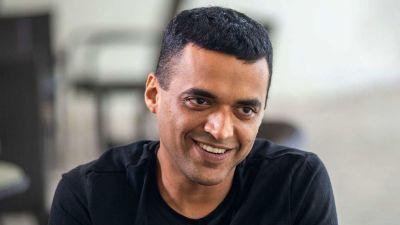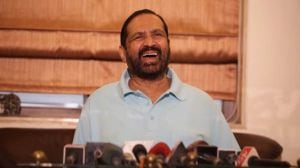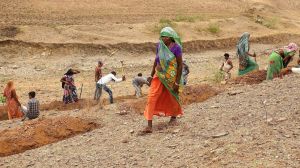UN Secy Gen arrives in Iraq to rocket attack
A rocket landed near Prime Minister Nouri al-Maliki8217;s office on Thursday during the first visit to Iraq by the new United Nations chief

A rocket landed near Prime Minister Nouri al-Maliki8217;s office on Thursday during the first visit to Iraq by the new United Nations chief, making Secretary-General Ban Ki-moon duck behind a podium. However, he escaped unharmed.
This is the first visit by the head of UN head in nearly a year and a half.
The attack came as al-Maliki8217;s government said it had been negotiating with Sunni insurgents for months, and the US military said it had released a senior aide to Shi8217;ite cleric Muqtada al-Sadr on al-Maliki8217;s request.
The rocket caused no injuries but rattled the building in the heavily guarded Green Zone, sent small chips of debris floating from the ceiling, and left a three-foot-wide crater about 50 yards away outside.
It struck right after al-Maliki, standing next to Ban, had finished telling reporters that Ban8217;s visit was a sign that Iraq was on the road to stability.
8220;We consider it a positive message to the world in which you confirm that Baghdad
has returned to playing host to important world figures because it has made huge strides on the road toward stability,8221; al-Maliki said in his opening remarks.
Ban had just finished giving an answer to question and it was being translated into Arabic as the rocket struck with a big explosion.
He appeared frightened, casting his eyes right and left as he rose after ducking behind the podium where he was standing and answering questions with al-Maliki. A worried-looking Ban turned to one of his aides and asked: 8220;Is it OK?8221;
Al-Maliki told his security guards, 8220;Nothing8217;s wrong,8221; as one of them moved to grab him. He then proceeded to answer a question and while that response was being translated, he turned to Ban and asked: 8220;That8217;s enough?8221; 8220;Yes,8221; he replied.
The last visit to Iraq by the head of the UN was in November 2005, by Ban8217;s predecessor Kofi Annan.
The United Nations headquarters in Baghdad was bombed by militants on August 19, 2003. As many as 22 people had died, including the top UN envoy, Sergio Vieira de Mello. The UN8217;s international staff withdrew from Iraq in October 2003 following a second assault on its offices and other attacks on humanitarian workers. A small staff has gradually been allowed to return since August 2004.
The US said it believed the peace process could be helped by Ahmed al-Shibani, who was captured in the Shi8217;ite city of Najaf during fierce clashes in 2004 between US forces and al-Sadr8217;s Mahdi Army militia, which has largely cooperated with a new security push by US and Iraqi forces.
The government released a photograph showing al-Maliki receiving a smiling al-Shibani at his office, underlining the close ties between the prime minister and al-Sadr.
The US military said it had determined that al-Shibani 8220;could play a potentially important role in helping to moderate extremism and foster reconciliation in Iraq8221;.
Al-Sadr8217;s support kept al-Maliki in his job last year, since the cleric8217;s loyalists have 30 of the 275 seats in Parliament and six Cabinet posts.
- 01
- 02
- 03
- 04
- 05






























